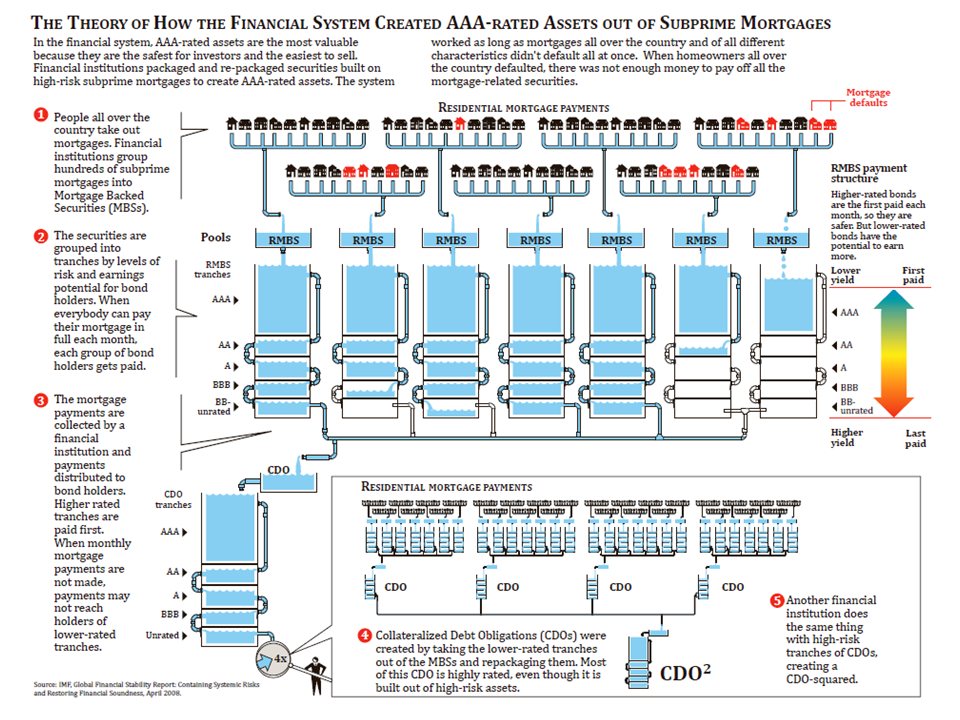Well that's kinda what I was talking about - because isn't it basically impossible to do effective risk assessment in such unprecedented situations, no? Lower interest rates were always going to lead to lending to poorer people - like you said - and that's always going to increase risk, in any realistic set of expectations. It's not reasonable to expect anything else, imo, which makes the policy of low interest rates inherently risky.
Okay, so we're going to get a bit Dick Cheney here, but there are risks and then there are risky risks. Essentially: poorer people are risker than the richer people in that poor people default more often. However, if you know how likely each is to default (say, 10% and 5%), then there's not actual difference in the long-run expected value between the two. As an example, say I can have a 50% chance of winning £8, or a 25% chance of winning £16. The risk is higher on the latter but in the long-run they represent propositions of equal expected value. Additionally, when we say "the long-run", that's actually quite short for financial instruments that are pretty responsive, so I don't mean "over 10 years things would be the same", I mean "over the next year things would be the same".
The problem was not that poor people were riskier than rich people, it's that poor people were riskier than banks expected them to be. Banks thought they had a 50% chance of winning £8 or a 25% chance of winning £16, but they ACTUALLY only had a 25% chance of winning £8. That's entirely independent of interest rates. As it happens, banks were also terrible at working out how risky middle class people were, but it didn't matter because interest rates were so low that even though lots of middle class people also saw sub-prime mortgages, the rest compensated. This wouldn't have been the case if interest rates had been high from the start - we would, as I said early, just have seen a collapse of the banking system from a different point.
The interest rates had very little to do with things. If you were a magic foresight wizard, you'd have hiked interest rates pretty high quite sharply in 2006 and probably delayed the crash a little by trying to compensate for how bad banks were at guessing risks by raising their rates for them, but that is, at best, a very temporary solution - they'd just have crashed later because the fundamental problem is still there and you can't raise interest rates forever.
Sure it does. Markets only become more efficient at providing services or goods by existing businesses either changing the way they operate or otherwise going bust due to heightened competition making them go bust. This competition might come from existing businesses or new businesses, but in the long term this is a good thing. It's why we don't have any shitty British cars anymore. In the short term it's a bad thing because companies go bust, people lose their jobs etc.
I mean sure, businesses getting forced out of markets because of competition is ultimately good (or rather, it's not good in and of itself, but indicates a good process is happening). That's not what happened here. Businesses didn't go bust because of competition, they went bust because the market shrank. In fact, the most common thing that happened was that smaller, entry-level firms with smaller capital stocks were the most likely ones to go bust while the big boys remained, so actually it reduced competition as a whole by weeding out the more responsive and flexible small innovators.
The problem is that low interest rates allowing businesses to stay alive when they'd "normally" - and I know there's no "normal" interest rate, but the low rates on this period and for such length were relatively unprecedented - has a similarish effect as Walmart turning up, loss-leading everything to put the competitors out of business and then hiking up the prices; They can use the earnings from the rest of their branches to suck up the losses, and these businesses with unusually cheap loans can do the same, harming the competition (or potential entrents to the market). This can obviously harm the size and quality of any given industry or market (and it's part of the reason why the EU's not a fan of government subsidy of businesses right - cause it harms other business' ability to compete in that market KINDA LIKE COMMERCIAL TV AND THE BBC AINT IT). All this matters because you have these shit companies existing when their could be better alternatives, then they give up the ghost during a recession when no fucker has any money to start alternative businesses, so then you lose the shitty company and you don't have the alternatives popping into place. All of which obviously has some impact on consumption.
No. Low interest rates aid competition more than they help it. Big firms can get big loans anyway, because they're just less likely to go bust in the long run. Most markets face pretty consistent and difficult barriers to entry that prevent true competition happening. The most effective method of breaking these barriers to entry is to allow smaller firms easier access to financial capital, and they have more access to this at low interest rates.
[this last bit is actually some really cool cutting edge stuff and there are some fun papers on it. there's a new orthodoxy developing that suggests that interest rates have more of a J-curve effect on investment than previously thought, and it maps onto data from the late 90s/early 00s really well]



